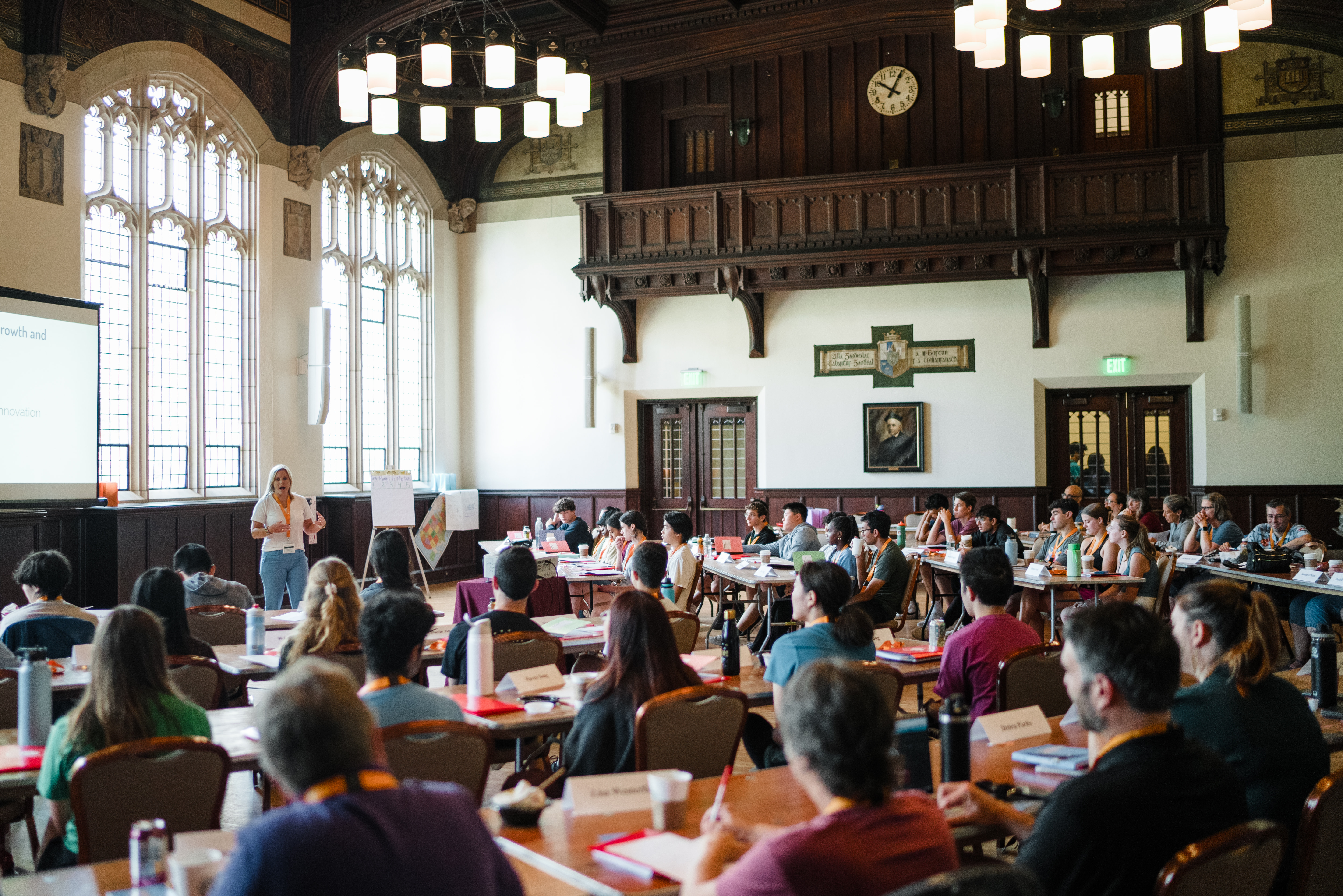Lesson 2 Activity: Nobody Knows Everything

- >
- Teachers
- >
- Teacher Resources
- >
- Lesson Plans
- >
- Economics of Disasters
- >
- Lesson 2 Activity: Nobody Know…
Lesson Overview
Based on television game shows in which contestants are pitted against an audience group, this activity is designed to illustrate what Frederic von Hayek famously identified as the “knowledge problem.” Explaining why economic systems that depend on centralized allocation of resources have been unable to produce wealth and comfortable standards of living for citizens, Hayek pointed to the difficulty of gathering the knowledge necessary to effective use of resources:
“[K]nowledge of the circumstances of which we must make use never exists in concentrated or integrated form, but solely as the disperse bits of incomplete and frequently contradictory knowledge which all the separate individuals possess. . . . “(Hayek, 519-20)
Hayek argued that the central task of economic systems is “. . . rapid adaptation to changes in the particular circumstances of time and place” (Hayek, 524), meaning that economic decision-makers must first know about those “particular circumstances” before they can make decisions about how to best allocate resources. The fragmented, dispersed nature of knowledge presents a formidable obstacle to centralized decision-making in normal times; how much more imposing must that obstacle be in the chaos of disaster?
Hayek went on to explain how market institutions overcome the knowledge problem, using price to carry the necessary information to decentralized decision-makers. (See Lesson 2, point 2 for a more detailed explanation of Hayek’s analysis.) This activity is designed only to establish the importance of local knowledge in economic decision-making and to help students understand that even the best of intentions cannot overcome the “knowledge problem.”
It is common for people to react to the overwhelming destruction of natural disasters by assuming that large-scale centralized response is necessary to deal with the aftermath. Stories of the inevitable failures and mistakes that plague such Herculean relief efforts are then met with disgust at the stupidity or venality of the officials in charge. This quick activity puts students in the role of the decision-makers. Ask to respond to the “specific circumstances of time and place,” they learn the importance of local knowledge, the difficulty of accessing the right knowledge at the right time, and the reality that even good intentions and hard work may not suffice to overcome the “knowledge problem,” especially in the urgent circumstances of disaster. The activity sets the stage for further study of the roles that different institutions – markets, government, and non-profits – can play in the aftermath of disasters.
Video Demonstration
Time Required:
1 class period
Materials:
- PowerPoint slides of the game questions and answers
- small prizes – candy, homework points, etc. – 3 or 4 per student
- (Optional) Role cards for contestants
Procedures
1. Challenge students to play your classroom version of “1 vs. Many.”
- Option: Create role cards and distribute them to students before starting the game. Color code the role cards so all potential contestants’ role cards are the same color. Challenger role cards can be a variety of colors and some of them should include the bits of local knowledge necessary to answer the contest questions correctly.
2. Use Visual #1 to explain the rules of the game:
Round 1:
- Each person in the room will be given a _____ (small prize – candy, etc.)
- The selected contestant will stand at the front of the room with his/her prize.
- The contestant will be asked one question, to be answered aloud at the end of the 10 second time period. During the 10 seconds, the challengers (other class members) will each write the answer on a sheet of paper at their desks. Answers must be specific; categories or generalities – like “food” will not be accepted as correct answers.
- When the question is repeated, the contestant must answer aloud.
- If the contestant’s answer is correct, he remains in the game, and receives the prizes from all the challengers who answered incorrectly.
- If the contestant’s answer is incorrect, she forfeits her prize and returns to the challenger pool. The challengers keep their prizes and a new contestant is chosen.
Subsequent rounds:
- If the contestant from Round 1 is still in the game, then only the contestant and the challengers who also had the correct answers will participate in round 2. (Optional: You may wish to double the prizes to all who remain in the game, so that the stakes are higher with each successive round.)
- If there is a new contestant, play the next round exactly as round 1 was played, distributing one new “prize” to each class member.
3. Play several rounds of the game. Four questions and answers are included in the game materials and more can be created to address disasters in current events. (See PowerPoint slides, attached above.)
- News coverage of “human interest” stories in disasters is a good source of real-world examples that can be turned into contest questions. Because the purpose of the activity is to impress students with the impossibly vast amount of knowledge that a central planner would need to respond effectively to disaster, it is important to use verifiable anecdotes rather than stories “based on real events” or imaginary scenarios. (See the Case Study, “Sample Illustrations: Knowledge of the Circumstances of Time and Place,” in Lesson 2 for explanations and the sources of the 4 contest questions included in this activity.)
4. Debrief:
- Who was successful and who was unsuccessful in answering the questions and why?
- If no role cards were used, it’s likely that no one will answer any of the questions correctly – and those who do will do so by chance. Students should note that they just did not have knowledge of the specific circumstances
- If students were given role cards, those with the knowledge of local circumstances will know the right answers, and this is an important point to bring out in the discussion. The expertise and experience of the contestant cannot substitute for local knowledge.
- What characteristics of the contestants were important in getting the answers right? What characteristics don’t seem to have mattered much? Why? Again, emphasize that knowledge is local – people who’ve been there, lived there, worked there, have knowledge that others do not have. Although experience, compassion, qualifications, honors, etc. are important personal characteristics, they don’t help much without the necessary knowledge. Help students to recognize that while caring and hard work are important qualities, they may not be enough to produce the desired outcomes.
- Think about the challenger who has the knowledge and information that would help. Why isn’t it likely to figure in the decision-making about disaster response? As Hayek pointed out, it’s difficult to find out who has the knowledge, and it’s also difficult to getting the knowledge from the local source to the decision-makers. To see the magnitude of the problem, imagine the Vietnamese student (See role cards, below.) trying to call the heads of international disaster relief efforts to tell them about his experience with elephants.
- Frequently, there is a great deal of criticism of government and international agencies’ (like the UN) response to disasters, and the news media often features stories pointing out mistakes and ineptitude. What does this activity suggest about explanations that blame problems that surface in disaster relief on the stupidity or lack of compassion of officials in charge? Students should begin to recognize that explanations based on “uncaring or stupid people doing bad or stupid things” not only aren’t very satisfying, they also aren’t very convincing. Help students to articulate that our ability to respond to crises like disasters is shaped in large part by the institutions we charge with the task – that, at a very basic level, “the system” determines the effectiveness of the people working in it. Having now identified one of the problems of disaster response – the gathering, communicating, and processing of the necessary information – students are ready to look at which institutions are best suited to that task.
1 vs. Many Rules:
Round 1:
- Each person in the room will be given a _____
- The selected contestant will stand at the front of the room with his/her prize.
- The contestant will be asked one question, which must be answered aloud at the end of the 10 second time period. Once I begin reading the question, everyone must be silent. Anyone who talks will be eliminated from the game and forfeit the prize.
- During the 10 seconds after I read the question, the contestant will think about the answer, and the challengers (other class members) will each write an answer on a sheet of paper at their desks
- Answers must be specific; categories or generalities – like “food” will not be accepted as correct answers.
- Challengers will put down their pencils. The question will be repeated and the contestant will answer aloud.
- If the contestant’s answer is correct, he remains in the game, and receives the prizes from all the challengers who answered incorrectly. The second round will be played with the contestant and only the challengers who answered correctly in the first round.
- A contestant who answers incorrectly forfeits the prize and returns to the challenger pool. The challengers keep their prizes and a new contestant is chosen.

Foundation for Teaching Economics Opens Student Application for Summer 2026
January 12, 2026 The Foundation for Teaching Economics is pleased to announce that applications for Summer 2026 student programs are…

Making Economics Meaningful for Students
The Fund for American Studies’ Liberty and Leadership podcast features FTE’s own Amanda Stiglbauer, a longtime member of our team who recently…

From Student to Leader: Bret’s Transformative Experience at the EFL Program at UC Berkeley
November 13, 2025 Bret Chen had always been drawn to the world of business. As a high school junior from…
